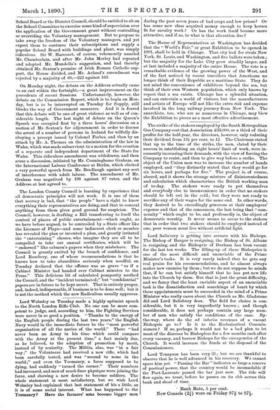The strike of the stokers employed by the South Metropolitan
Gas Company cost that Association 233,000, or a third of their profits for the half-year, the directors, however, only reducing their dividend from 13* per cent, to 12. The Chairman stated that up to the time of the strike, the men, elated by their success in establishing an eight hours' limit of work, were in- cessantly increasing their demands, with the view of forcing the Company to resist, and then to give way before a strike. The object of the Union men was to increase the number of hands employed, and "they distinctly stated that they would go for six hours, and perhaps for five." The project is, of course, absurd, and it shows the strange mixture of disinterestedness and calculation which characterises the British working nem of to-day. The stokers were ready to put themselves and everybody else to inconvenience in order that no stokers should be left out in the cold ; but they were not ready to sacrifice any of their wages for the same end. In other words, they desired to be exceedingly generous at their employers' expense and that of the consumers, the last being that " com- munity " which ought to be, and professedly is, the object of democratic worship. It never seems to occur to the stokers that in order that two stokers should be employed instead of one, poor women must live without artificial light.






































 Previous page
Previous page